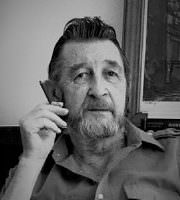About Thomas McGrath
Thomas McGrath (born November 20, 1916 in Sheldon, North Dakota; died September 20, 1990 in Minneapolis, Minnesota) was an American poet. The achievement that is without question the greatest in his work is the book-length poem, Letter to an Imaginary Friend. Here McGrath tends towards the very long line-he calls it a six-beat line-often broken up on the page. Here McGrath's imagery, which returns time and again to North Dakota and to Sheldon, as it were for an anchoring place, is dazzling, deriving from personal and political sources, and from his extensive reading, not only in modern poetry but in history, philosophy and mythology. The subject matter of his poems is as complex as his forms. Though his life is often the subject of his poems, he is not, in the usual sense of that term, a confessional poet. Rather, he uses his life, and that of his family and friends, as he uses Sheldon. McGrath, the subject of the poem, is everywhere. He is a radical American, exploring, from that vantage point, the peculiarities, the vagaries, the humor, and often the horror of contemporary experience. As a radical, his approach is often that of the outraged man, furious at injustice, especially the injustice and inequity which derive from socio-political sources, but also the Injustice which is a condition of being human.Because of the outbreak of World War II, he could not use a Rhodes scholarship awarded to him and continued his studies first at the Louisiana State University in Baton Rouge, where he made the acquaintance of his later publisher Alan Swallow. In 1940/1941 he was a lecturer at Colby College in Maine, but had no taste for teaching and then went to New York, where he was politically active, wrote and worked in a shipyard until he was drafted in 1942. He spent most of his service at the air force base on the Aleutian island of Amchitka. In 1945 he was dismissed with the rank of sergeant and was finally able to study at New College in Oxford in 1947/1948 on his Rhodes scholarship.
After returning to the United States, he taught at Los Angeles State College from 1951 to 1954. McGrath's characteristic voice is first clearly heard in two early books, published after his return from the service. The first is To Walk a Crooked Mile, published by Swallow and William Morrow in 1947, the second Longshot O'Leary's Garland of Practical Poesie, published by International Publishers in 1949. Both of these volumes strongly bear the imprint of McGrath's war experiences, the first dedicated to Jimmy McGrath, killed June 1945, the second concluding with the powerful Blues for Jimmy, occasioned by his brother's death and dedicated to him. His release from there was directly related to his appearance as an uncooperative witness before the Un-American Activities Committee. He processed this experience in his only science fiction novel The Gates of Ivory, the Gates of Horn (1957), a dystopian vision of a machine-controlled America. In the years that followed, McGrath worked as a private school teacher and in various jobs to earn a living. From 1960 he was able to work academically again, first at C. W. Post College in New York State, and then from 1962 at North Dakota State University in Fargo. In 1969 he moved to his first alma mater, Moorhead State University in Minnesota, where he remained until his retirement in 1983.
McGrath died in 1990 at the age of 73.
Browse all poems and texts published on Thomas McGrath









